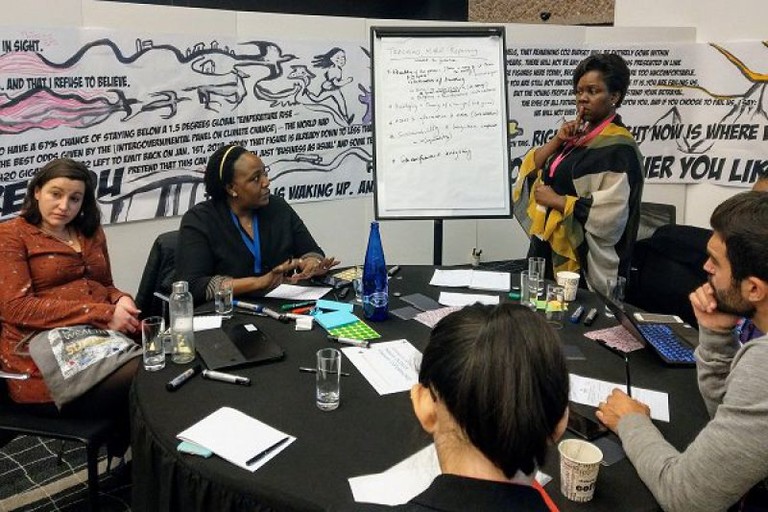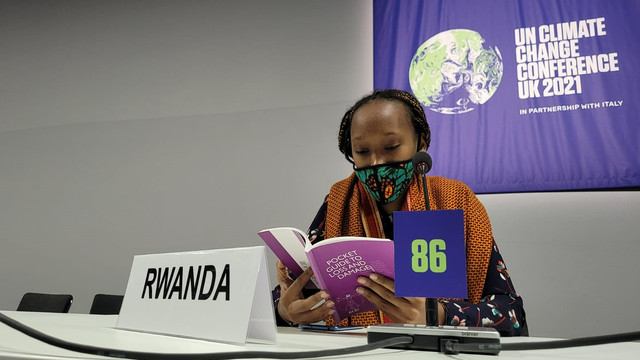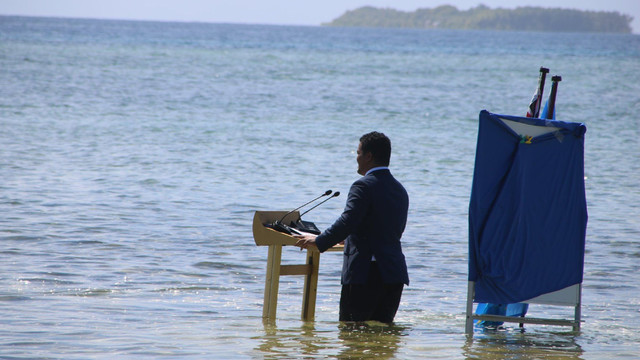Development and Climate Days 2020
With no UNFCCC COP in 2020, Development and Climate Days (D&C Days) went fully digital from 2-3 December, as part of the Understanding Risk Forum 2020 (UR2020)

A session at the 2019 D&C Days. The event, which will take place online this year, encourages participants to “interact, challenge existing thinking and generate new ideas, leaving no one behind” (Photo: Anne Schulthess, IIED)
Usually held each year alongside the Conference of the Parties (COP) to the UNFCCC, D&C Days is hosted in partnership, using a dynamic format that encourages dialogue on a range of issues that link policy, knowledge and practice for climate ambition.
This year's event was part of the Understanding Risk Forum 2020 (UR2020), the world’s primary event bringing together experts and practitioners in the field of disaster risk assessment and risk communication.
Two days of discussion and dialogue took place on Wednesday, 2 December and Thursday, 3 December, using digital technologies to share learning experiences by engaging, being productive and having fun.
And the Red Cross Red Crescent Climate Centre summed up the two days, including a focus on a 2050 time-capsule project.
- Watch a recording of the session on how biodiversity loss is an underestimated risk, bringing perspectives from climate, development and business
- Watch a recording of the session on managing risk through nature-based solutions
Find out more about D&C Days and the forum, and see the full programme below.
Wednesday, 2 December
Building for resilience: looking at race for resilience and actions to COP26 and beyond
Date: Wednesday, 2 December
Time: 10-10.55am (GMT)
Organised by: Global Resilience Partnership (GRP)/Climate Resilience Network (CRN), Food and Agriculture Organisation of the United Nations (FAO)/UN Climate Resilience Initiative A2R
The COVID-19 pandemic has brought resilience to the fore. It has laid bare the vulnerability of our societies and economies when they do not identify and plan for risk. This dialogue focused on the need for ambitious actions on building resilience and identify what can be done in the run-up to COP26, and how to set up a decade of action.
It was led by High Level Climate Champions, benefiting from the outcomes of regional resilience dialogues they conducted over September and October, and shared plans on the developing Race for Resilience and ways to engage more of non-party stakeholders into the race.
Reshaping a resilient future in response to COVID-19
Date: Wednesday, 2 December
Time: 11-11.55am (GMT)
Organised by: Global Resilience Partnership (GRP), Stockholm Resilience Centre, World Resources Institute (WRI), International Centre for Climate Change and Development (ICCCAD), Potsdam Institute for Climate Impact Research (PIK), Complex Systems in Transition (CST)
The COVID-19 crisis has exposed the vulnerability of our global society to systemic risks. Learning from this crisis is crucial, since it is a harbinger of a new global risk landscape where events such as pandemics, financial crashes and synchronised food shocks spread more quickly and widely than ever before. Critically, this new risk landscape is having disproportionate impacts on vulnerable and marginalised groups.
Clearly, we cannot 'recover' back to business as usual from the COVID-19 shock. We need to build a resilient future that ensures the capacity to sustain, or improve, human wellbeing in an equitable manner and in the face of systemic uncertainty, shocks and change. Resilience science and practice has provided rich insights on the attributes and types of interventions that underpin truly resilient, long-term development. This is the moment to start translating this progress into broader-scale action that builds resilient economies, societies and communities in a post-COVID-19 world.
Using ‘adaptation technologies’ to improve policy and planning at national level
Date: Wednesday, 2 December
Time: 11am-12.55pm (GMT)
This session looked at how community-based innovation and implementation of ‘adaptation technologies’ could improve the impact of national policy and planning. The discussion will include how the ‘business case’ is built for government to invest in certain adaptation technologies and/or create the enabling environment for uptake of other adaptation technologies – such as smart subsidies, public-private partnerships and incentives. It will also explore the fact that uptake requires technologies to be viable, so evidence and examples of relevant ‘business models’ are also needed.
Related reading: Energy for all: Better use of subsidies to achieve impact | Building local impact for better access to climate finance | What is 'aggregation' and how can it get climate finance working for the most vulnerable?
Risk and candour: reconciling intentions, words and actions in an age of bullshit
Date: Wednesday, 2 December
Time: 3-4.55pm (GMT)
Organised by: Red Cross Red Crescent Climate Centre
Why a humanitarian event on 'bullshit'? The answer is simple: it is our job to care. And as climate risk management practitioners it’s hard to care for others when others don’t care about the insidiously pervasive nonsense cooking climate inaction. The deep mismatch between rhetoric, intentions and deeds is not unique to climate and development: we live in an age of bullshit (indifference to the truth). Philosopher Harry Frankfurt, in his book "On Bullshit" (2005, Princeton University Press) identifies this as ‘one of the most salient features of our culture’.
We deepened that analytically rigorous framework by examining the four 'flavours' of bullshit (promissory, nonsensical, contradictory, and whatevering), and the current incentive structures making bullshit palatable to people and organisations.
The power of grassroots voices to shape effective climate policy
Date: Wednesday, 2 December
Time: 3-4.55pm (GMT)
Grassroots organisations have a distinct and critical role in advancing social change, specifically in the area of community resilience to climate change. These communities are already facing the consequences of climate change and have, for years, been developing innovative strategies and solutions to address these challenges. In light of this, grassroots organisations must be considered key stakeholders in the development of climate adaptation policies and programs and should be driving agendas and priorities on climate adaptation.
This session showcased grassroots organisations’ experiences and insights from developing innovative and effective climate resilience strategies, solutions, and policies. It will also discuss the impact of partnerships between other urban stakeholders, such as development agencies and multilaterals, and grassroots movements in channelling resources and institutionalising effective policies at scale.
Related reading: New narratives for a 'new normal' | Emerging lessons from community-led COVID-19 responses in urban areas | Local must lead action to tackle world’s multiple interconnected challenges
Building radical collaborations for just, climate-resilient futures
Date: Wednesday, 2 December
Time: 3-4.55pm (GMT)
Unusual, unexpected and often risky connections are needed to spark transformative climate action. Yet, partnerships can be demanding, difficult to find the right fit, and sometimes provide more obstacles than opportunities. As youth leading climate action in our communities, we ask: how might we build together the just, climate-resilient futures that we deserve?
In this hands-on session, we explored how to foster effective and meaningful partnerships that centre climate justice. By bringing you together for these considerations, we codesigned principles which incorporate risk-taking, and equipped participants with a map to hopefully guide their radical collaborations beyond this digital workshop.
Related reading: Can the impact of COVID-19 unite coalitions of young and old? | Disruptive resilience: an agenda for the new normal in cities of the global South
Thursday, 3 December
Launching a time capsule for our future ancestors
Date: Thursday, 3 December
Time: 3-3.55am (GMT)
Organised by: Red Cross Red Crescent Climate Centre
How will the choices we make today affect the lives of future generations, the people who are yet to be born? Over the course of several months we have brought together unusual pairs of individuals – philosophers and youth activists, writers and scientists – to discuss this very question. What makes a 'good ancestor' and how can we collectively be better at thinking about the long-term?
Now we are ready to pack up the insights in a time capsule that will be sealed until the year 2050! A time capsule is a historic cache of goods or information, usually intended as a deliberate method of communication with future people. We gathered insights from our pairs and people around the world on what they would like to include in the time capsule for future generations to find.
Biodiversity loss is an underestimated risk: climate, development and business perspectives
Date: Thursday, 3 December
Time: 10-10.55am (GMT)
Speakers: Joanna Elliott, senior conservation director, cross-cutting programmes, Fauna & Flora International; Dilys Roe, principal researcher and team leader, Natural Resources, IIED; Natalie Seddon, professor of biodiversity at the University of Oxford and director of the nature-based solutions initiative; Liz Rogers, vice president, environmental technology, BP International
Biodiversity is essential for human life, yet we are losing biodiversity at unprecedented rates. This presents as much risk to our economy, society and environment as climate change does, but there is still much confusion and misperception about biodiversity – what it is, what it does, and why it matters. The impacts of biodiversity loss are severe and stretch far beyond the direct loss of fluffy mammals and colourful plants. Biodiversity loss is contributing to food insecurity, exacerbating climate change, destabilising communities and affecting human health. This event brought together expert speakers from climate, development and business backgrounds to discuss why biodiversity matters and outline how biodiversity loss is a critical and underestimated risk.
Related reading: United in a call for higher ambition on the global biodiversity agenda| Debt swaps for climate and nature: innovation for resilience? Make Change Happen podcast episode 8 | Biodiversity loss is a development issue. A rapid review of the evidence
Managing risk through nature-based solutions
Date: Thursday, 3 December
Time: 11-11.55am (GMT)
Speakers: Moderator Xiaoting Hou Jones, senior researcher, Natural Resources, IIED; Chip Cunliffe, director, sustainable development, AXA XL; Mike Jennings, strategic grant manager, South African National Biodiversity Institute; Vu Ley Y Voan, senior advisor, Forest and Farm Facility, Viet Nam Farmers’ Union
The world is facing two unprecedented risks: biodiversity loss and climate change. The causes of these parallel challenges are interrelated, as are the solutions. Nature-based solutions (NbS) is increasingly recognised for its role in addressing risks associated with biodiversity loss and climate change. Functioning ecosystems can buffer key climate change risks and reduce the risks and impacts of extreme events such as storms, landslides and floods. As carbon sinks, ecosystems also provide climate mitigation opportunities. Enthusiasm around NbS as a reliable solution to biodiversity loss and climate change has continued to grow.
This online event brought together practitioners from government, community and the private sector to explore how NbS is essential to managing risks associated with biodiversity loss and climate change, and is a critical ingredient in fulfilling international obligations and addressing local risk.
Related reading: Nature-based solutions to climate change adaptation | Working with nature to build back better from COVID-19: inspirations from farmers in China
From principles to action: enabling locally led adaptation
Date: Thursday, 3 December
Time: 3-3.55pm (GMT)
Speakers: Demetrio Innocenti, SAP manager, Division of Mitigation and Adaptation, Green Climate Fund; Gebru Jember Endalew, chair, Least Developed Countries Group; Cristina Rumbaitis del Rio, action track co-manager, Global Commission on Adaptation, World Resources Institute; Mithika Mwenda, executive director, Pan African Climate Justice Alliance; Sophie De Coninck, Local Climate Adaptive Living Facility (LoCAL) manager, United Nations Capital Development Fund
While it is widely accepted that climate change impacts are felt at the local level, adaptation finance rarely reaches the local level and it is rarer still for local-level stakeholders to lead their own adaptation efforts. Under the Global Commission on Adaptation, World Resources Institute and IIED are proposing a set of eight principles to catalyse adaptation that is truly owned and led by local actors.
This session outlined these principles and included a 'hard talk' panel during which panelists were asked to explain how their organisation’s work aligns with the principles and lay out potential measures for enhancing commitment to locally led adaptation action.
Related reading: Raising ambition in locally led action for 2021: calling for business unusual | Good climate finance guide: lessons for strengthening devolved climate finance | Calling for business unusual: why local leadership matters
Dynamic format for D&C Days 2020
D&C Days 2020 was held entirely online during the week of the Understanding Risk Forum 2020, via video conferencing software.
The dynamic format used by D&C Days encourages dialogue on a range of issues that link policy, knowledge and practice. Innovative virtual approaches encourage participants to interact, challenge existing thinking and generate new ideas, leaving no one behind.
Among those who joined were those at the frontline of sustainable development and climate agendas, including practitioners, NGOs, grassroot organisation representatives, national climate leaders and policymakers at all levels.
This year’s D&C Days event was hosted in partnership by the Red Cross Red Crescent Climate Centre (RCCC), International Institute for Environment and Development (IIED) and the Global Facility for Disaster Reduction and Recovery (GFDRR), with EIT Climate-KIC, the Food and Agriculture Organization of the United Nations (FAO), Global Commission on Adaptation (GCA), Global Resilience Partnership (GRP) and the International Development Research Centre (IDRC).
Background to D&C Days
Usually held each year alongside the Conference of the Parties (COP) to the UNFCCC, D&C Days is developing as a strategic partnership platform, with the host partners aiming to influence the ‘ambition mechanism’ processes under the UNFCCC.
D&C Days started in 2002, and has since become a popular part of COP, providing an opportunity for researchers, practitioners and negotiators to meet informally for honest and open discussions on news, ideas and solutions on climate change and development.




